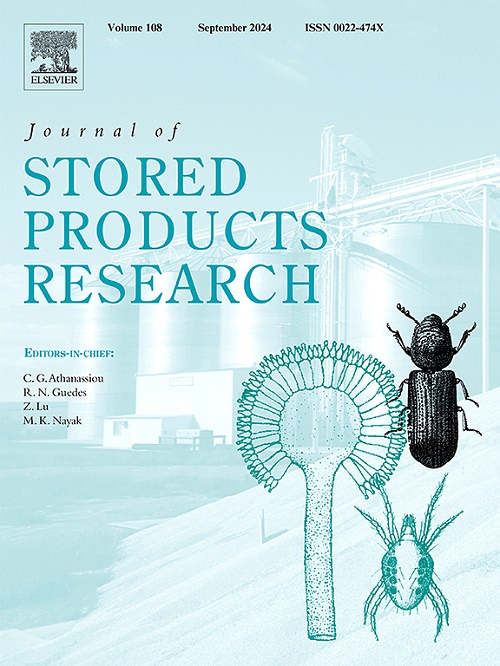Evaluation of some plant products against Trogoderma granarium everts and Rhyzopertha dominica fabricius in pearl millet and their effects on nutritional composition and organoleptic characteristics
IF 2.7
2区 农林科学
Q1 ENTOMOLOGY
引用次数: 0
Abstract
The present study was conducted to elucidate the nutritional and germination losses in 6–75 % infested grains of stored pearl millet caused by Trogoderma granarium Everts and Rhyzopertha dominica Fabricius. Four botanical powders (Neem, Lemon grass, Citrus and Eucalyptus) were used to manage these insect pests during storage and their subsequent impacts on nutritional and organoleptic characteristics as well as germination. Insect infestations manifested detrimental effects on nutritional quality and germination of grains in proportion to the increasing levels of infestations. Both insects caused significant reductions in the key nutritional parameters including crude protein, total soluble protein, total sugars, ash and crude fat contents with more pronounced losses caused by R. dominica, except crude fat content, where T. granarium infestation showed significantly higher negative impact. Conversely, the phenolic content of grains was higher with the increasing infestation levels of both insects. Principal component analysis (PCA) also revealed distinct differences between insect infested and insect-free grains. Among botanicals, Neem leaf powder at 2 % concentration effectively controlled the grain damage (69.88 %; 66.84 %) and weight loss (68.69 %; 55.85 %) by T. granarium and R. dominica, respectively for 6 months. However, Neem leaf powder at even 1 % concentration was more effective as compared to other botanical leaf powders (Eucalyptus, Citrus and Lemon grass). Treated pearl millet grains with Neem leaf powder showed minimum losses in nutritional parameters and germination. Khichdi (native palatable food recipe) prepared from uninfested but treated grains exhibited good acceptability.

几种植物制剂对珍珠谷子中谷粒Trogoderma granarium everts和Rhyzopertha fabricia的防治效果及其对营养成分和感官特性的影响
本研究探讨了储运珍珠粟6 ~ 75%侵染后籽粒营养和萌发损失的原因。四种植物粉末(印楝、柠檬草、柑橘和桉树)用于控制这些害虫在储存期间及其随后对营养和感官特性以及发芽的影响。虫害对籽粒营养品质和发芽的影响与虫害程度成正比。两种昆虫对小麦的主要营养指标包括粗蛋白、总可溶性蛋白、总糖、灰分和粗脂肪含量的影响均显著降低,除粗脂肪含量显著降低外,多米家蝇对小麦的影响更为显著。相反,两种昆虫侵染程度越高,籽粒酚含量越高。主成分分析(PCA)也显示了侵虫和无虫籽粒之间的显著差异。在植物药中,2%浓度的印楝叶粉对籽粒的防治效果为69.88%;66.84%)和减肥(68.69%;55.85%),分别饲养6个月。然而,与其他植物叶粉(桉树、柑橘和柠檬草)相比,即使浓度为1%的印楝叶粉也更有效。经印楝叶粉处理的珍珠粟籽粒在营养参数和发芽率方面损失最小。Khichdi(本地美味食品配方)由未感染但经过处理的谷物制成,表现出良好的可接受性。
本文章由计算机程序翻译,如有差异,请以英文原文为准。
求助全文
约1分钟内获得全文
求助全文
来源期刊
CiteScore
5.70
自引率
18.50%
发文量
112
审稿时长
45 days
期刊介绍:
The Journal of Stored Products Research provides an international medium for the publication of both reviews and original results from laboratory and field studies on the preservation and safety of stored products, notably food stocks, covering storage-related problems from the producer through the supply chain to the consumer. Stored products are characterised by having relatively low moisture content and include raw and semi-processed foods, animal feedstuffs, and a range of other durable items, including materials such as clothing or museum artefacts.

 求助内容:
求助内容: 应助结果提醒方式:
应助结果提醒方式:


